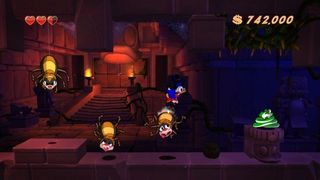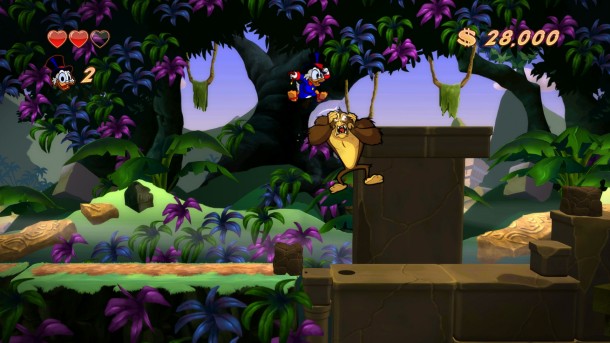Our Verdict
More rehashed than remastered, your childhood might be better served holding onto old memories rather than making new ones.
PC Gamer's got your back
Swan-diving into a vault of gold is a funny thing. On the one hand, you've got so much gold, you can swim in the stuff. On the other, gold is a soft metal, but it's not that soft. As you're barreling towards your fortune at 9.8 meters per second, thinking about how lucky you are, you'll have just enough time to realize what a silly decision you've made before breaking your face on a glimmering treasure pool. I had a similar experience as I nostalgia-dove into DuckTales: Remastered 17 years after my first experience with the original 1989 NES version.
Other than an updated soundtrack, original TV cast voice actors, and a fresh coat of paint, the remastered version remains utterly faithful to the original, featuring the same five levels with some adjustments: Amazon, Transylvania, African Mines, Himalayas, and The Moon, plus a new tutorial level and final battle location. From the outset, I was smiling and bobbing my head to the classic DuckTales theme, unable to hold back the obligatory “woo-oo!” as the retouched 8-bit melody teleported me back to the summer of '96. The hand drawn sprites are beautifully done, endearingly emotive, and uniquely Disney. The 2.5D sets are nice on their own, but at times odd-looking beside the superior sprites. That the combination is fine wouldn't be so disappointing if this weren't a Disney property published by Capcom—myself and my childhood expect better.

DuckTales' “remastered” moniker belies issues consequent to its faithfulness to the original—this is very much a 24-year-old game. Pogo-jumping Uncle Scrooge on his cane through thorny Amazonian tunnels or over craggy lava flows can feel about as natural as controlling the Mars rover via marionette puppet. Whether I played with a keyboard or controller, it always felt like there was a sponge between the buttons and my fingers, resulting in countless, infuriating deaths due not to lack of skill, but an unresponsive duck too set in his ways to jump, “JUMP, damn you!” when I tell him to. Beside modern platformers like Spelunky and Rayman Origins , DTR's mushy controls are inexcusable. And when you do die because of them, you'll be sent back to the start of the level, potentially setting you back 10 minutes. It's this kind of old-school disregard for player time that made certain sections hardly worth continuing. If it weren't for this review, I wouldn't have.
Outside of levels, Scrooge's office contains the level selection hub, a museum to purchase concept art with money collected on adventures, and a vault where Scrooge can swim through the money you've collected over multiple playthroughs. Extras such as being able to play in 8-bit mode a la The Secret of Monkey Island: Special Edition, or even an emulation of the original would have been fantastic. Heck, why not throw in the original soundtrack while you're at it? DTR needs these things because a game that's going to stay this true to its ancient self has got to offer more than antiquated gameplay. Without them, it ends up feeling like that doodad on your grandparents' mantel—interesting to look at, but tough to figure out why it exists in the first place.
More rehashed than remastered, your childhood might be better served holding onto old memories rather than making new ones.

